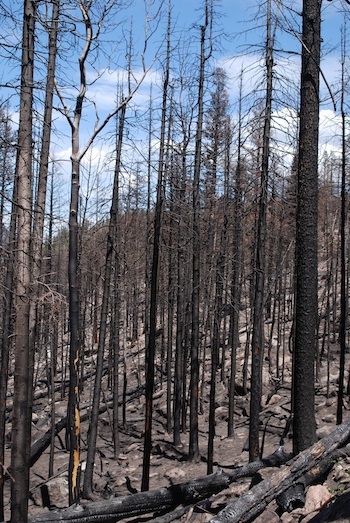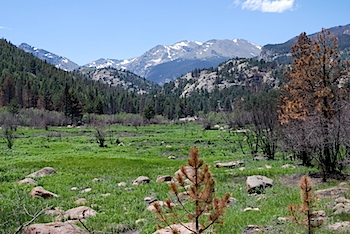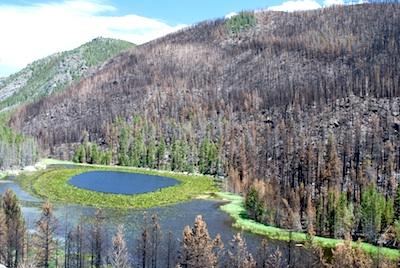A few hours spent enjoying the Cub Lake Trail in Rocky Mountain National Park shows off both the calamity of careless campers, and the rebirth of a landscape.
This trail that heads off from the western end of Moraine Park weaves through acreage burned by the Fern Lake Fire in the fall and winter of 2012-13. Almost every step of the way from the trailhead to the junction with the Fern Lake Trail bears some signature of the fire, which investigators determined had been sparked by an abandoned campfire, one that had been illegally set.
Though just 3,500 acres in size, relatively small in the scope of Western wildfires, the Fern Lake blaze left deep scars on the landscape surrounding Cub Lake and across parts of Forest Canyon.
Thousands of blackened snags -- standing dead trees -- rise above the charred ground, and countless more are scattered like Pick Up Stix across the ground. Rising from meadows are black clumps of sticks that once were green willows.
Not only has the fire greatly impacted wildlife habitat in the short term, but it has left the landscape prone to erosion, a point driven home last Thursday by a rock-and-mud slide along the Fern Lake Trail.

Blackened snags, totems to the Fern Lake Fire, surround some sections of the Cub Lake Trail. Kurt Repanshek photo.
And yet, the land is healing itself, in some places quickly. Meadows near the trailhead are lush this summer with forbes, grasses, and wildflowers. There is a jarring juxtaposition in places of burned forest and green forest, a mosaic reflecting the power of wildfire, as well as its whims.
From its trailhead, the Cub Lake Trail quickly crosses the Big Thompson River on a wooden bridge and runs roughly three-tenths of a mile to the South Lateral Moraine Trail, and then turns almost 90 degrees to the right and runs another two miles to Cub Lake. Along the way you can easily see both the burned landscape and how the meadows and forest are healing themselves.
Some guidebooks say this area is a reliable place to spot elk in fall, though whether the burned area will send these ungulates somewhere else remains to be seen. They could be particularly lured by the fresh meadow vegetation.
What haven't moved are the large erratics -- glacially deposited boulders that encourage scrambling on.
Ponderosa pine and aspen dominate the vegetative landscape here, though there also are stands of willows in the marshier areas.
Running along the north shore of Cub Lake, the trail offers several places where you can make it down to the shoreline to enjoy a picnic lunch or snack. As it heads west along the lake, the trail rises in elevation and provides you with sprawling views down upon the lily-pad strewn lake and to the mosaic of burned and living forests above it.
While you can simply retrace your steps to the trailhead, continuing on will take you through burned areas that show off not only the great impacts of the fire, but also the regrowth that's under way. At one point you'll also happen upon a newly built footbridge across a small creek.

Some areas of Moraine Park burned by the Fern Lake Fire were showing vigorous regrowth during the summer of 2013. Kurt Repanshek photo.
A little more than a mile past Cub Lake you'll come to a junction with the Fern Lake Trail. Turning right will lead you 1.7 miles to the Fern Lake Trailhead, where you can either wait for a shuttle bus to take you back to your car at the Cub Lake Trailhead, or you can walk the mile, give or take, back to that trailhead.
While there are aspects of the Fern Lake Fire that are very devastating, the burn also likely will lead to vigorous rebirth of the forest, a rebirth that will provide valuable wildlife habitat. Park officials point out that the area burned by this fire had not burned in more than 800 years.
"Consequently," they note, "there will be benefits to that area such as new forests and greater plant diversity. The fire has cleaned up the forest floor in areas, which will create better wildlife habitat."
If You Go
Cub Lake Trail
Trailhead: Cub Lake Trailhead on western end of Moraine Park. There's little room for vehicles here, so you might consider leaving your car at the Moraine Park Park & Ride area and riding the shuttle to the trailhead.
Distance: 6-mile loop by continuing past Cub Lake and heading back to your car via the Fern Lake Trail.
Difficulty: Easy
Maps: Pick up a free copy of the park's Bear Lake Area Hiking brochure at the Beaver Meadows Visitor Center.
Because of the high number of snags standing along the trail, take care on windy days to watch for trees that might be blown down by gusts.


 Support Essential Coverage of Essential Places
Support Essential Coverage of Essential Places







Comments
I remember the lily pads on Cub Lake very well. That was 15-20 years ago when I lived an hour and a half from the park. I also remember one fall sitting in our vehicle near the trail head for cub lake and watching a bull elk leading a harem away from a compeating bull elk.